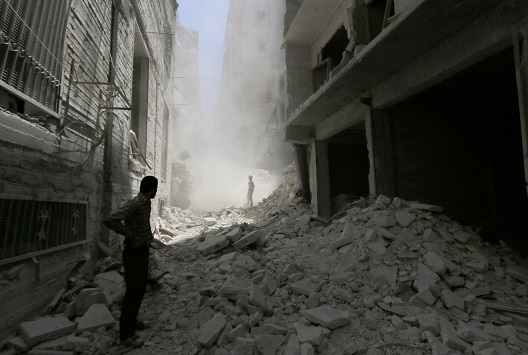 Three distinguished American ex-diplomats—Ryan Crocker, William Luers, and Thomas Pickering—wrote on July 12 in The Washington Post, “In Syria, the choice for Bashar al-Assad’s government is either to turn its military power against the Islamic State or to continue to kill fellow Syrians… It makes no sense for the West to support a war against Assad as well as a war against the Islamic State. Assad is evil, but in this case he is certainly the lesser evil.” To label the leader of Syria’s top crime family an evil lesser than ISIS is to offer a poor guide to those who must craft and implement policy.
Three distinguished American ex-diplomats—Ryan Crocker, William Luers, and Thomas Pickering—wrote on July 12 in The Washington Post, “In Syria, the choice for Bashar al-Assad’s government is either to turn its military power against the Islamic State or to continue to kill fellow Syrians… It makes no sense for the West to support a war against Assad as well as a war against the Islamic State. Assad is evil, but in this case he is certainly the lesser evil.” To label the leader of Syria’s top crime family an evil lesser than ISIS is to offer a poor guide to those who must craft and implement policy.
What if Assad continues his longstanding policy of killing fellow Syrians in conjunction with ISIS? Should modest American help for those resisting the twin menace of Assad and ISIS be altogether dropped? Indeed, the formula advanced by the three authors seems disjointed. The first sentence (Assad’s choice of targets) is hypothetically true. The second (drop the Western war on Assad) is a non-sequitur. The third (who is more evil) lacks relevance.
Yes, Assad might elect to choose between killing fellow Syrians and turning against ISIS. Yet now he has the best of both worlds. His priority to date—fully supported by Iran and Russia—has been to concentrate his own military firepower on civilian populations sheltering rebels. With rare exception, the regime has avoided fighting ISIS. This is because ISIS too—for its own reasons—is fixated on beating Assad’s Syrian opposition. Why would the Assad regime feel compelled to choose? It can continue de facto collaboration with ISIS in places like Aleppo while sending the occasional air force sortie out toward the Iraqi border to buzz ISIS positions or perhaps drop a bomb on the desert. For Bashar al-Assad the paramount political objective is to kill the Syrian opposition. Until he can proclaim “mission accomplished,” he needs ISIS to help him.
Why then would it make no sense “for the West to support a war against Assad as well as a war against the Islamic State?” Because Assad is less evil than his ISIS counterpart, Abu Bakr al-Baghdadi? Surely, there must be a sounder reason to counsel President Obama to abandon his stated policy of helping Syria’s opposition. A debate over greater and lesser evils cannot be a reliable guide.
Assad and Baghdadi are both criminals. Each is responsible for heinous war crimes and crimes against humanity. The United States has helped assemble an impressive dossier for the eventual prosecution of Assad and his key aides: one bulked-up by the regime’s Nazi-like penchant for keeping extensive files on its own atrocities. No doubt records are being collected on the depredations of Mr. Baghdadi too. If one wanted to measure the relative evil of these two by the numbers of people killed, maimed, tortured, and rendered homeless, Mr. Assad would be well ahead. Yet professionals of the Crocker-Luers-Pickering caliber know that the policy options here are not about evil, much less greater or lesser quantities thereof residing in a pair of criminals.
Surely, these three distinguished statesmen have something else in mind when they call on President Obama to abandon the Syrian opposition. Perhaps they hope that Bashar al-Assad will indeed opt to end his program of mass terror against fellow citizens and concentrate instead on ISIS. Perhaps they believe he can be induced to do so. This hope and this belief, however, cannot be grounds for the President of the United States to pull the plug on those not only resisting the mass homicide of a rapacious regime, but those who—unlike the regime—are actually fighting ISIS.
No doubt there are reasons to debate the efficacy of belatedly bringing the US Department of Defense into the training, arming, and equipping of beleaguered Syrian nationalist enemies of Assad and ISIS. No doubt President Obama’s objective of seeing Assad gone and replaced by a decent government for all Syrians would be something better than parlous had better decisions been made over the past two years. The recent administration request to Congress for $500 million to accomplish that which should have been done long ago seems unaccompanied by any sense of urgency.
There is little, unfortunately, to indicate that the Obama administration intends to do anything significant anytime soon to help in meaningful ways an opposition squeezed between two sets of murderous enemies. To stop US support—meager as it has been—for the battle against Assad per the advice of these impressive former public servants would be to yield something for nothing: something even beyond material help. If the regime and its foreign backers are prepared to give something of substance to the people of Syria in return for such a gesture, those who advocate making it might specify the price to be paid and how it could be secured. Assad’s supposed lower order of evil simply is not enough for President Obama to cap a troubled Syria policy with abject surrender.
Frederic C. Hof is a senior fellow with the Atlantic Council’s Rafik Hariri Center for the Middle East.
Image: A man stands on the rubble of collapsed buildings at a site hit by what activists said was a barrel bomb dropped by forces loyal to Syria's President Bashar al-Assad on Monday, in the Al-Fardous neighbourhood of Aleppo July 15, 2014. (Photo: REUTERS/Hosam Katan)
